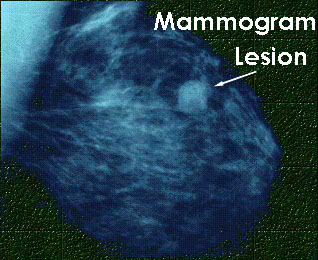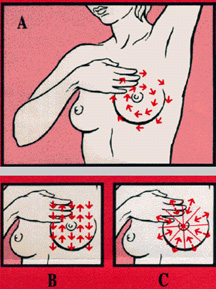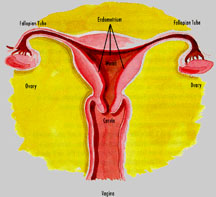


 Table of Contents
Table of Contents
Oral Contraceptives are the most widely used form of birth control. Studies have demonstrated that oral contraceptives have many benefits in terms of reducing ovarian and uterine cancer, but there has recently been some evidence that it can promote breast cancer, the leading cancer among women. The studies usually link an increased risk in early onset risk of cancer to the use of oral contraceptives. Young women being diagnosed with cancer is a rare occurence, but it does happen. It is in getting breast cancer early in life that a possible link between oral contraceptives and breast cancer has been studied. In other words, if a women gets beast cancer at a young age, it may be influenced by the use of oral contraceptives. Though many scientists question the findings, the results deserve continued study. In this page there will be some information about breast cancer, the pill, and the link between the two.

AGE CHANCE OF DEVELOPING BREAST CANCER 25 1 IN 19,608 30 1 IN 2,252 35 1 IN 1,622 45 1 IN 43 65 1 IN 17That's why it is important to do weekly Breast cancer self-exams.

Other information on Breast Cancer


Birth control pills are the most widely used form of birth control by women. 10.7 million American women use oral contraceptives.
 Three-quarters of pill users are under 30. Most of these women are single and childless. Birth control pills are also the preferred method of contraception for unmarried women living with a partner.
Three-quarters of pill users are under 30. Most of these women are single and childless. Birth control pills are also the preferred method of contraception for unmarried women living with a partner.
Birth control pills are convenient, you just need to swallow them an you're protected. No fuss, no mess. That is why they are more appealing than condoms. This is how the pill works. Most female oral contraceptives contain progesterone derivitives, whose ingestion induces a state of pseudo-pregnancy. Ovulation occurs when there is a surge of two hormones, follicle stimulating hormone (FSH), and lutinizing hormone (LH). The pill inhibits the surge of FSH and LH preventing ovulation and pregnancy. The uterine wall still thickens, therefore menstruation still occurs.
There are many types of pills with varying hormonal levels. The hormone levels has dramatically decreased since the 1960's when the pill was introduced. Now, there is about 35mg of hormone in the pill compared to and avarage of 165mg in th 60's. The most popular type of pill is the combined pill which has both progestin and estrogen. There are also progesteron only pills. Some pills you must take every day, while others are not taken for a few days out of the month. Oral contraceptives are also used for other purposes like regulating the menstrual cycle. In some instances oral contraceptives are given to young teenage girls to regulate their menstrual cycle.
More information about birth control pills can be found at this site:


Early studies correlating breast cancer to oral contraceptives were non-existent, but now studies can be performed on long term use of birth control pills. A link has now been determined between breast cancer and birth control pills. Birth control pills have become one of the risks in developing breast cancer. Studies have shown that use of oral contraceptives may increase the risk for early onset of breast cancer.
Louise Brinton, Ph.D., and others focused on women younger than age 45, because these women had the pill available during their entire reproductive lives. In the population-based case-control study, data were analyzed on 1,648 women who were diagnosed with in situ (localized breast cancer) or invasive breast cancer in the early 1990s and a control group of 1,505 women who did not have breast cancer. Results showed that risk for breast cancer was enhanced for women under age 35 who had used the pill for 6 or more months. Compared to non-users, these women had about a 70 percent increased risk of developing breast cancer. Risk was further increased among women in this age group who used the pill long-term, especially if they also began to take the pill before age of 18.
Among pill takers, women under age 35 who had a first degree relative with breast cancer appeared to have a greater increased risk than did women without such a family history. However, this difference in risk associated with pill use was not statistically significant, and thus it could have been due to chance. The researchers will conduct further analyses on this group of women.
Among women ages 35 44, there was an increased risk associated with use of the pill, although at a much reduced level compared to younger women and with less evidence of a relationship to duration of use.
Researchers estimated that at the risk level found in this study, long-term pill users (10 or more years of use) or recent users (within 5 years of breast cancer diagnosis) would account for one additional case of in situ or invasive breast cancer per year for every 100,000 women ages 20 34.
As a result of this study, researchers believe that the relationship between the pill and breast cancer in younger women appears to have a biologic basis rather than one created by bias or extraneous factors influencing study findings. However, the biological reason for this relationship is not known.
It is also unknown whether certain patterns of pill use or types of pills may influence risk and whether the excess risk in young women is carried into later years. Brinton and colleagues are now conducting analyses of types of pills used and patterns of use, and they plan to follow participants as they age.
Summary of points above
Other documents linking oral contraceptives to breast cancer.

The studies do have their critics. They site many other factors which influence breast cancer. They cited that researchers should look at other factors thought to influence breast cancer like age, onset of first menstrual period, genetic history, having the breast cancer gene,age,and diet while examining the effects of oral contraceptives.  Diet is also suggested as important in the factors leading to breast cancer. High fat intake may increase the risk of breast cancer while increasing intake of fruits and vegetables may decrease the risk of breast cancer. Questions arose on how different types of pills and varying hormonal levels were addressed or rather not addressed in studies.
Diet is also suggested as important in the factors leading to breast cancer. High fat intake may increase the risk of breast cancer while increasing intake of fruits and vegetables may decrease the risk of breast cancer. Questions arose on how different types of pills and varying hormonal levels were addressed or rather not addressed in studies.
Furthermore, a dose response curvehas not been determined. Some contradictory information suggests that suppressing ovulation induces a more natural state in a woman.

I believe the evidence for oral contraceptives causing breast cancer is considerable and should be especially noted by women who already have a predisposition toward breast cancer like those who carry the "breast cancer gene". Trully, the information should be considered by all women expecially those with risk factors. Women should consider all birth control options and their consequences before deciding on one. Other bithe control options may be a better choice.

For more information on breast cancer and its link to oral contraceptives the on line book  Oral Contraception and Breast Cancer can provide detailed information. There is also a useful book review on the subject.
Oral Contraception and Breast Cancer can provide detailed information. There is also a useful book review on the subject.
 Melvyl and
Melvyl and  Carl are great resouces to retrieve article and book information on the subject.
Carl are great resouces to retrieve article and book information on the subject.
The following has been added by the Electronic Desktop Project:
 Contact Us
Contact UsIf you are an educator who is using our NEXTSTEP or virtual applications in the classroom, we would especially like to hear from you. Let us know what you are doing and how it is working out. Continued support for this project will depend on its impact in science education.
If you are an educator who is interested in making use of our NEXTSTEP or virtual applications, please let us know how we can help.
 Return to the Electronic Desktop Project home page
Return to the Electronic Desktop Project home page
![]() Check out the WWW Virtual Application Catalog from the EDP
Check out the WWW Virtual Application Catalog from the EDP
 Check out the NEXTSTEP Application Catalog from the EDP
Check out the NEXTSTEP Application Catalog from the EDP
 Visit the home page for California State University, Los Angeles
Visit the home page for California State University, Los Angeles